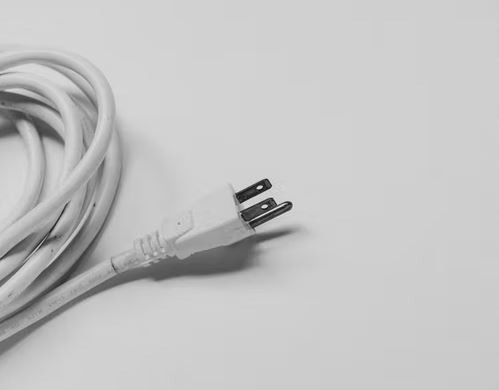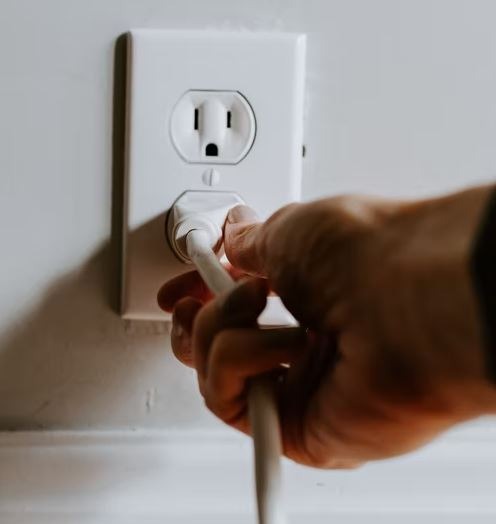Although an outdoor extension cord is extremely weather-resistant, it won’t last forever in snow, ice, rain, or wind. Outdoor cords can withstand the elements for a long time, but eventually, the strength of the cord will prevail. When necessary, use an outdoor extension cord. After using it, return it to a warm, dry location.
What is an Extension Cord?
An extension cord is a segment of flexible electrical power cable (flex) that has one or more sockets on one end and a plug on the other, typically of the same type. The phrase is also used to describe extensions for other types of cabling, but it usually refers to mains (household AC) extensions. The term “adapter cord” may be used if the plug and power outlet are of different types. Although they can be made up to 300 feet long, most extension cords are between two and thirty feet long.
Since at least 1925, people have been referring to extension cords. Extension cords are available in a variety of colors, lengths, thicknesses, and functions. In general, thicker cords with larger wires inside are required for appliances that require more power. Cords that will be used outdoors, in moist environments, near oils, or exposed to prolonged sunlight should be chosen for these circumstances. An extension leads rolls up into the socket end of an extension reel, which occasionally has multiple sockets—typically two or four—on it. Another type of extension reel allows the user to draw the cord out by grasping the socket end and hanging close to the plug end.
A polarized plug and receptacle, grounded terminals, a power-on indicator, a fusible link, or even a residual-current device, also known as a ground-fault circuit interrupter or GFCI, are all safety features that some extension cords include. Some cords have several female connectors close to one another, while others have them spaced out along the cord’s length. Connectors that are grounded or ungrounded are typically found on cords. While it is possible to force a grounded male connector into an unground female socket, doing so is dangerous.
Is It Safe to Leave Extension Cords Plugged In?
Do extension cords pose a risk to your safety? A rough estimate shows that extension cords have been responsible for more than 4000 injuries, 3300 of which involved house fires. Is keeping the extension cord plugged in fatal? Yes, this has already claimed the lives of more than 50 people. The short answer is no, it’s not safe to leave extension cords plugged in. Do not use extension cords as your main source of power and never leave them plugged in. You may only experience a minor electric shock right now, but it could later cause fire risk and other unintended accidents.
Using Extension Cords Outside Safely
It’s essential to be able to run power outside, but you also need to know how to use extension cords outside safely to prevent any disastrous mishaps. Any household needs an extension cord because it allows you to direct power outside to trim bushes, power a bounce house for a kids’ party, or provide lighting for an evening get-together. Although using an extension cord is simple, there are some safety precautions you need to take if you want to use extension cords outside without incident.
Make Use of Extension Cords Designed for Outdoor Use
Use only outdoor-specific extension cords because they are constructed from materials that can withstand moisture, temperature changes, the sun, and even foot traffic. For the task at hand, you must choose the right cord. Recognize that there is no one-size-fits-all cord and choose one that can handle the combined wattage of all connected devices. Keep in mind that a wire’s capacity to handle more current increases with its size.
A cord with an outdoor-use rating has additional layers of protection to protect the delicate wires inside from freezing temperatures, water, and snow. The additional shielding layers protect the wires from harm that might result in an accident.
Outdoor extension cords are frequently strong, so they can withstand being battered by the elements. Even though outdoor extension cords are durable, you should never leave them outside for more than a few days. Your cord will be more likely to break down if you leave this outside for a long time, which could cause sparking, fire, or shock. Finally, because they are not designed for rugged use, indoor extension cords should never be used outside. Additionally, there are ways to wrap extension cords for storage.
Examine Your Outdoor Receptacle
Making sure the outlet outside your home is suitable for use is another helpful tip for using extension cords safely. A Ground Fault Interrupter (GFI) or Ground Fault Circuit Interrupter must be installed in the outlet. For those who are unfamiliar, the GFI is a safety outlet designed to prevent dangerous electrical mishaps like shocks and short circuits that can result in fires. The amount of electric current passing through a circuit is frequently monitored by the GFI. The outlet is built to immediately trip the circuit upon detecting any loss of current.
Locate every trash can outside your house, and then look for a tiny button on each one of them to check for the GFI. Pushing this button will restart the outlet. Check to see if this button is functioning properly. Not all receptacle models are created equal. The GFI button for the specific brand of outlet on your property might be located near the breaker box. The GFI button can be found in the kitchen, the power room, or any other room in your home. However, before using your extension cord outside, locate the GFI and make sure it is operational.
Connect the Extension Cord to a Minimally Used Outlet
If possible, you ought to route the extension cord through places with little foot traffic. This is crucial safety advice because it can reduce the risk of slip-and-fall and trip accidents. Working with extension cords can occasionally be challenging. Additionally, it is best to hire a qualified electrician if you are unsure of your actions or check for a more durable one, like the ReelWorks Heavy Duty Extension Cord.


